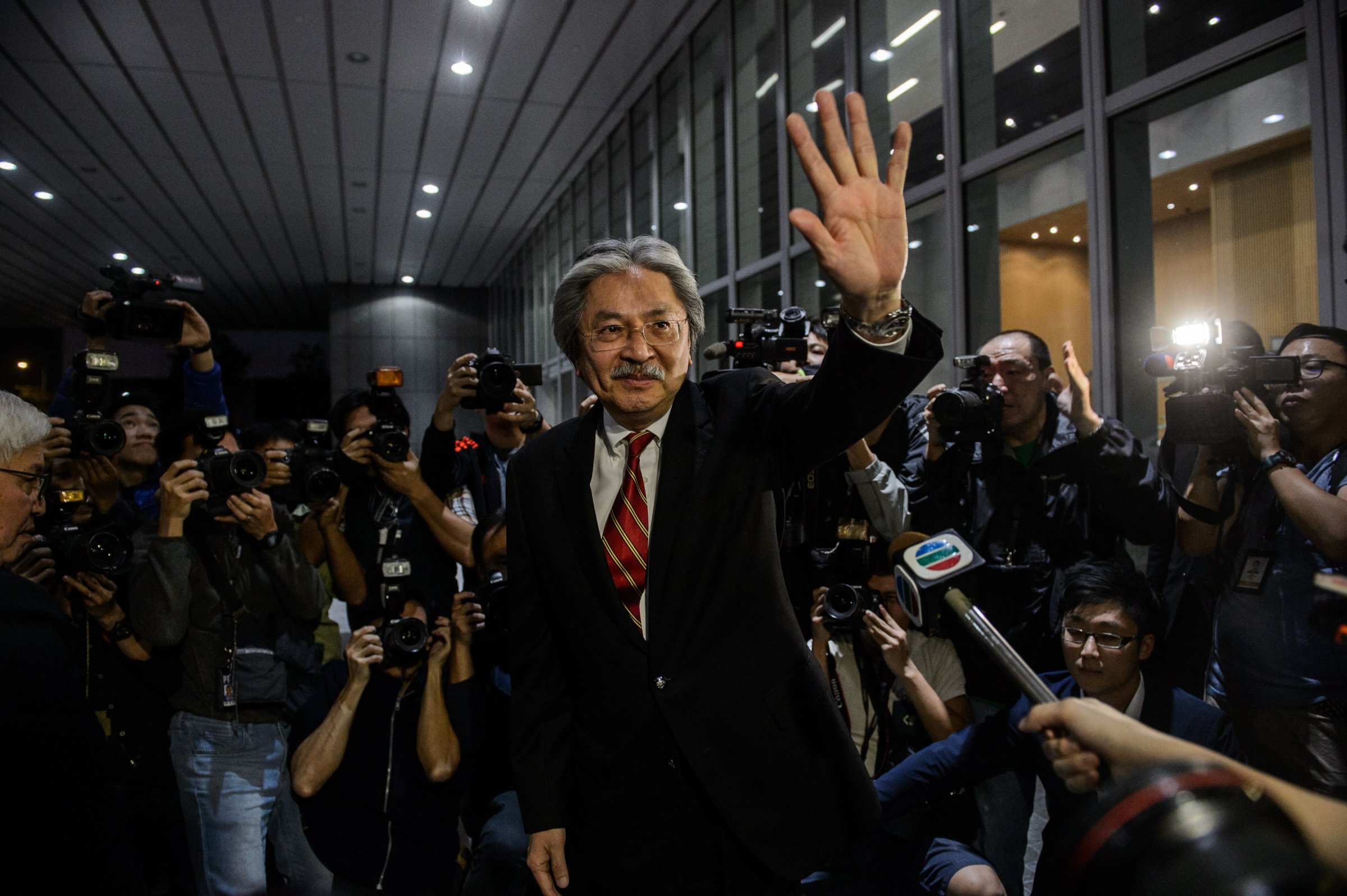
John Tsang, the former Financial Secretary of Hong Kong, is enjoying himself. It’s a Saturday afternoon in what the territory considers springtime — humid skies grey and heavy with pollution from mainland China; not particularly warm but not really chilly either — and dozens of enthusiastic Hong Kongers have engulfed Tsang outside the subway station in the northern suburb of Tai Wai, where he has come to meet the people. The election for Chief Executive (CE), the semiautonomous Chinese territory’s top political job, is just days away.
“Hong Kong people need hope right now,” says 35-year-old Jacky Tam. “I think he’s the one who can bring it.”
For a career civil servant, Tsang is remarkably good at the whole politicking thing. What that means in the second decade of the 21st century is mostly the ability to withstand — and indeed look happy about — the large throngs of supporters mobbing you when you’re out in public, shoving for a spot by your side so they can stick their cellphones out and snap a picture. Occasionally you have to hold a child and take the selfie yourself, for the child’s mother.
“You will win!” one elderly gentleman shouts, as a family of four squeezes around Tsang to fit in the frame. “You’ve already won!”
The sad part is that all of this — the canvassing, the public affection, the polls that have Tsang leading in popularity by nearly 20% — is theater. The Hong Kong people have no good choice in this election, which is to say that they have no choice at all. Since 1997, when the British left and the world’s most capitalist city was folded into the world’s last communist superpower, the Chief Executive has been selected by a 1,200-member Election Committee dominated by establishment, pro-Beijing figures. The process, therefore, is not much more than a conduit for whomever the Chinese Communist Party (CCP) prefers — and is Beijing’s most important check on a territory otherwise constitutionally bequeathed with a “high degree of autonomy.”
The Umbrella Movement, the massive protests of late 2014 that demanded a popular vote for the CE, failed to change the system. Beijing’s interference in Hong Kong’s affairs has only intensified since. This was once a city that took pride in its efficacy, stability and success. Before, Hong Kong was all about bread-and-butter issues and getting rich. Now it’s politics and Hong Kong’s place — and space — within China.
The city is deeply fragmented, and there’s an air of bitter resignation — especially among the younger generation — over what many see as the territory’s bleak future: a dated, second-tier town subjugated to the CCP and its local acolytes. “There’s a high wall between the government and the people,” says Melody Chan, a 26-year-old office assistant. “We need someone who goes around the wall and comes down to the crowd.”
As far as the next Chief Executive is concerned, mainland authorities have made their preference clear: Carrie Lam, 59, the former Chief Secretary or No. 2 in the Hong Kong government, and, until they both resigned to run for CE, Tsang’s superior. Many Hong Kong citizens dismiss Lam as a tedious bureaucrat too respectful of Beijing, but the Chinese leadership favors her. Last week, the South China Morning Post reported that the senior Chinese official Zhang Dejiang, who leads China’s rubber-stamp legislature, had successfully persuaded several prominent tycoons — an important demographic on the Election Committee — to plunk for Lam. (A third contestant, retired judge Woo Kwok-hing, calls for greater democracy in Hong Kong, but is not a serious contender.) The vote takes place on March 26.
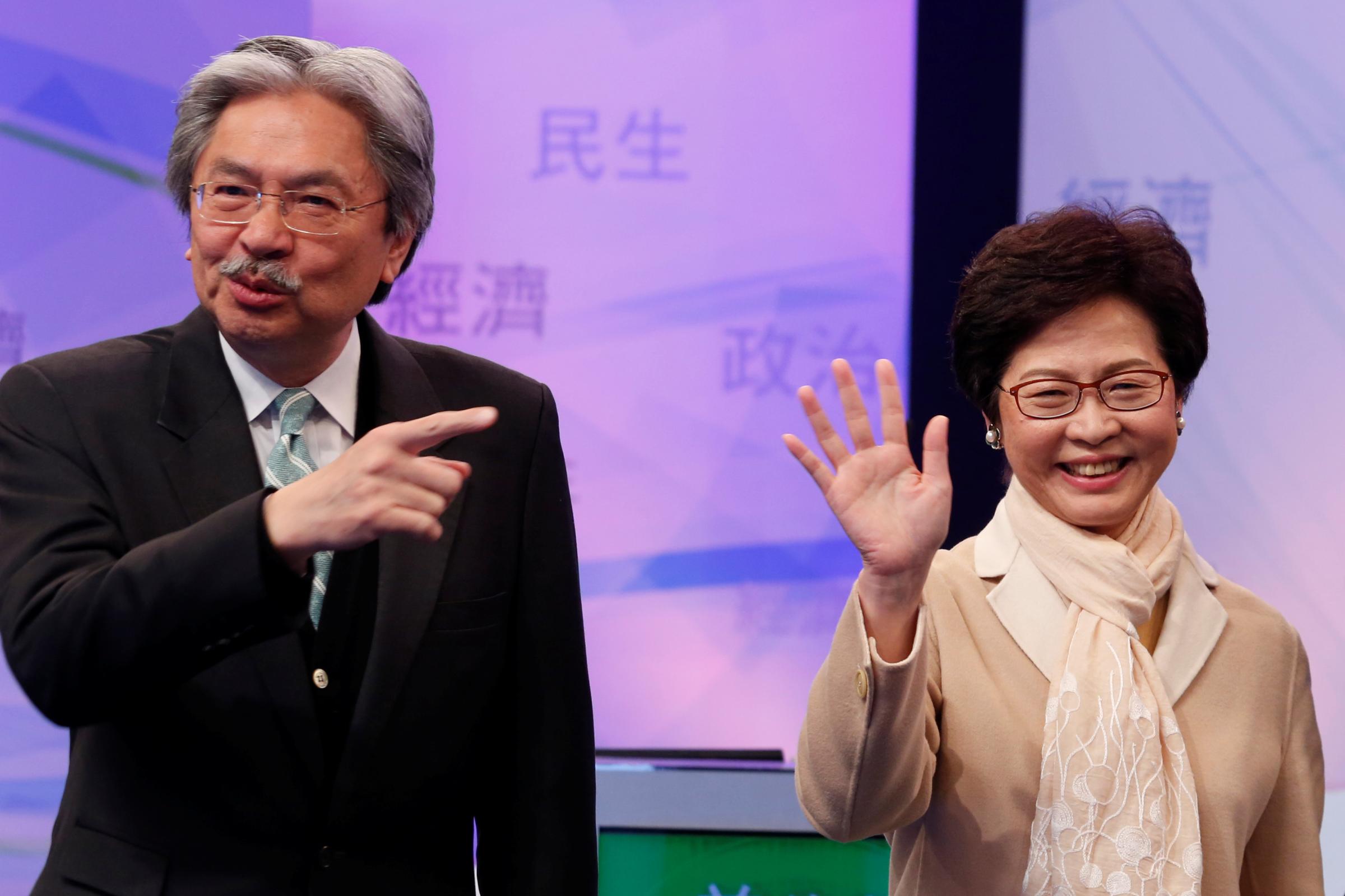
Tsang is undeterred, perhaps to the point of naiveté. “No one enters a race without thinking they will win,” he tells TIME. “Why are we campaigning? Because we have a way we think we can govern. I believe [Beijing] would want a Chief Executive who has cross-party support, who is supported by different parts of the spectrum. I think I’m the only one who has that.”
Since declaring his candidacy on Jan. 19, Tsang has engineered a fastidious, well-oiled campaign predicated upon a gamble: earn the support of the public, and Beijing, eager to alleviate troublesome and potentially contagious aggravations in Hong Kong, will follow suit. To that end, he has shed his past image as just another out-of-touch establishment suit — someone who, in a city with one of the widest income gaps in the world, once infamously characterized French cinema and drinking coffee as middle-class accoutrements. Instead, Tsang has spoken out in defense of controversial populist values: namely, the call for “universal suffrage,” the local term for direct elections. While the legislature is partly directly elected, Beijing has staunchly and repeatedly refused an open public vote for the CE; even the candidates have to be vetted first by a nomination committee similar in composition to the election one. Tsang projects his newfound image over his Facebook page, managed by young staffers who make a 65-year-old man seem far hipper than he would otherwise. (He recently made his own version of Jimmy Kimmel’s Mean Tweets sketch.)
The paradox is almost absurd: popular discontent with the pro-Beijing establishment is so pervasive that there are now loud calls for Hong Kong’s outright independence, and yet a thoroughly establishment figure is arguably the most popular candidate for Chief Executive in the two decades since the office was created. Some support Tsang grudgingly, describing him as the lesser evil, but many are sincerely enthusiastic, impassioned by his so-called populism and his promise that he will work to instate direct elections within three years.
“I feel like he’s with me,” says 25-year-old medical assistant Machi Ma. She says this standing in the waiting room of Tsang’s campaign office, having used her lunch break to walk over and make a donation.
As career bureaucrats, neither Tsang nor Lam is inspirational. But Tsang is the more curious character. He has a quarter of a million fans on Facebook and has accrued more than half a million U.S. dollars in online crowdfunding, the average of which, he says, is HK$200 (about US$26). The receptionist at his campaign headquarters, a nondescript but spacious office on the 35th floor of the cylindrical Hopewell Centre skyscraper, is kept busy with a steady stream of well-wishers. In one conference room is a bulletin board heavy with notes of support from Hong Kongers as far flung as Vancouver, a longtime bastion of Cantonese immigrants. (“The Hong Kongers here have witnessed the damage by the current government,” one reads. “We all support you.”)
“A lot of people think I speak their language — and I don’t mean Cantonese,” Tsang tells TIME. “I express their thinking. I’m not saying I can heal all the wounds — it’s not going to be hunky-dory overnight. But it seems that people believe that I’m the only candidate that has the potential to do that.”
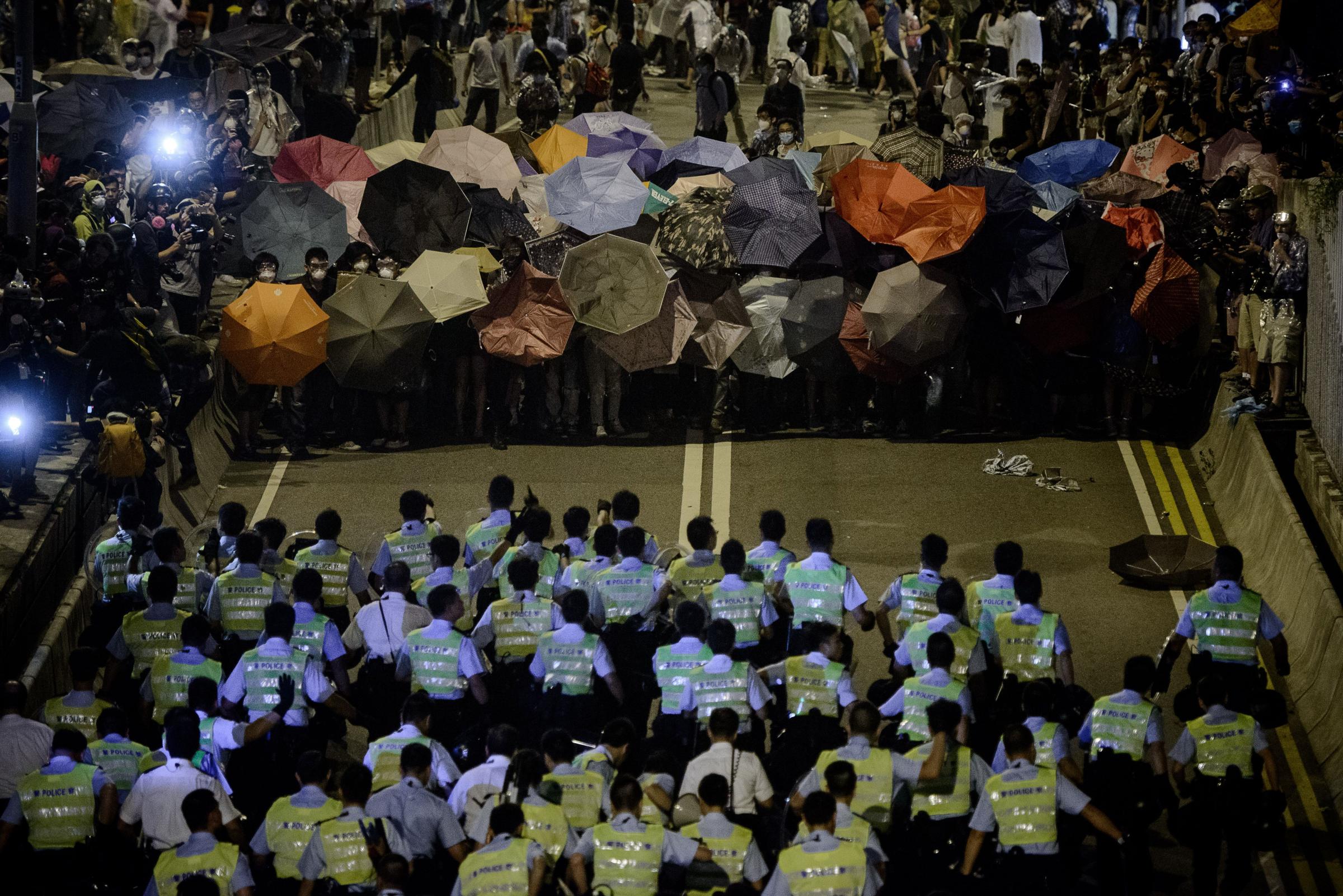
In person, it’s easy to discern that his popularity benefits from his disposition, which is affable. He cuts an avuncular figure, or rather carries one — the buttons on his grey cardigan strain just slightly against his paunch — and for decades has worn a hallmark mustache, which has prompted comparisons to Julius Pringles, the potato-chip mascot. (His nickname in Cantonese translates, endearingly, as “potato-chip uncle.”) When he speaks in English, his air and cadence are subtly but unmistakably American.
This, we know, is honest. In the mid-1960s, the U.S. repealed harsh immigration-quota laws that had been in place for nearly half a century, permitting thousands from Asia and elsewhere to settle in cities like New York City and San Francisco. Many came from Hong Kong, which then was still something of a colonial economic backwater shaken by the political tremors of the Cultural Revolution north of the border with China.
Tsang’s parents were among those who settled in Manhattan, when he was 13. They enrolled him at Stuyvesant High School, the prestigious Manhattan magnet school, where he was classmates with future U.S. Attorney-General Eric Holder. Tsang seemed to assimilate well. He fenced competitively, a sport he’d picked up as a boy in Hong Kong, and scored perfect 800s on several of his SAT subject tests. He studied architecture at the Massachusetts Institute of Technology.
Tsang describes his 20s in America as somewhat wayward. After M.I.T., he practiced architecture in the Boston area, unhappily and unsuccessfully. He then took a degree in bilingual education at Boston State College and began teaching and consulting on local curricula. By 1980, he had ended up at Harvard’s John F. Kennedy School of Government.
But he was distracted. “I was living a very comfortable middle-class life — two of everything,” he says. “Couple of kids, couple of dogs, couple of houses, couple of cars each. I looked around at my neighbors, who were older than me, and I was getting worried that in 30 years’ time I’d be just like them. I told my wife: ‘I think we need something else.’”
It was opportune timing. On the other side of the world, back home, Hong Kong was bracing itself for seismic change. The British claim on its last important colony was due to expire at the stroke of midnight on July 1, 1997, at which point China’s five-star red flag would be raised over the city. It was to be a symbolic victory for a rising China that still burned from the humiliation of being territorially “cut up like a melon,” as many Chinese describe it, by greater empires a century earlier.
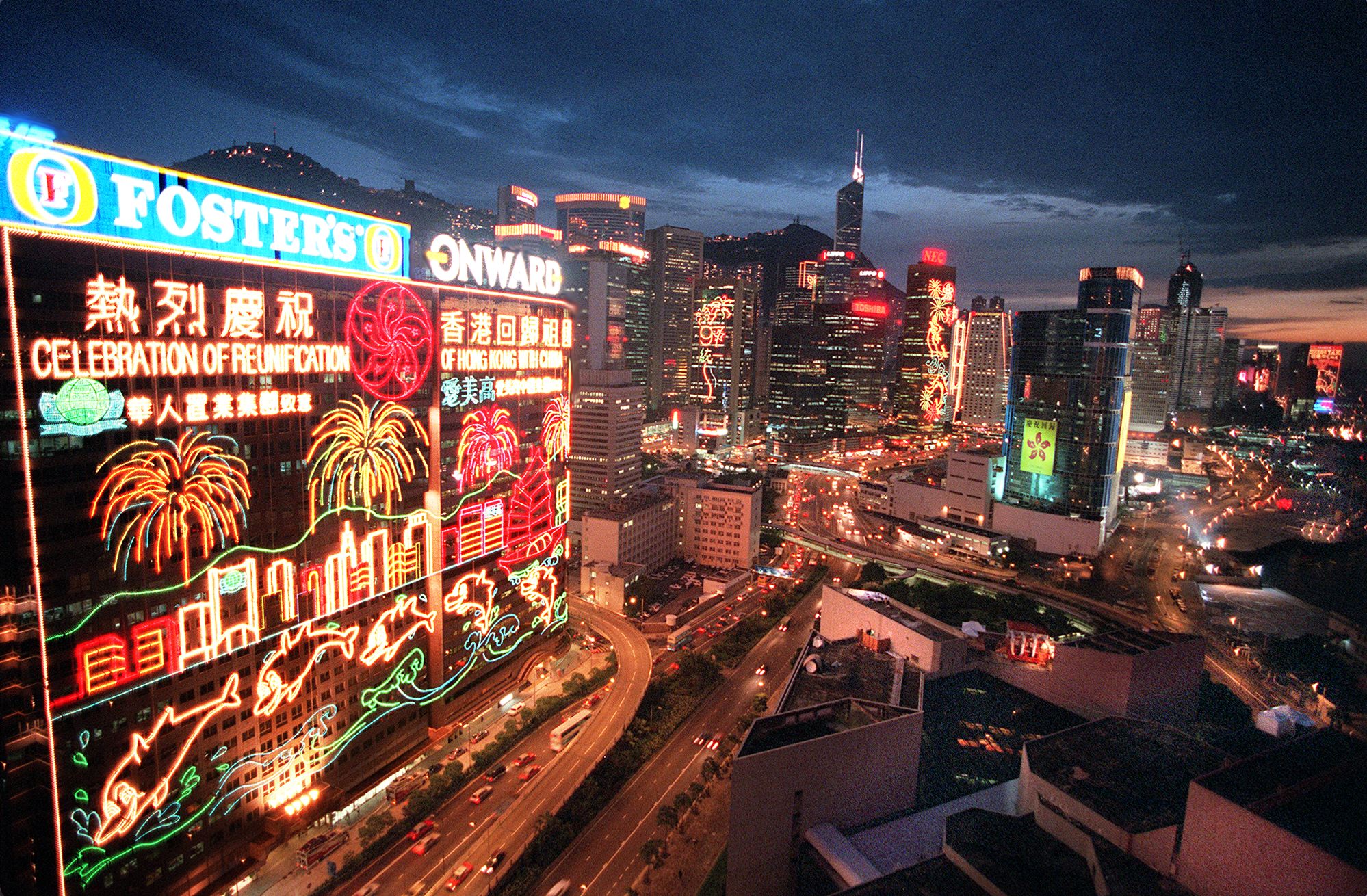
The problem was that Hong Kong simply was not China. Around that time, the laissez-faire economist and neoliberal firebrand Milton Friedman brought a television crew to the subtropical metropolis for his series Free to Choose, in which he celebrated it as a successful “laboratory experiment” in limited government. “If you want to see how the free market really works, this is the place to be!” he exclaims breathlessly in one shot, gazing out of a ferry window at the skyline.
Though most of Hong Kong’s economy is, in truth, controlled by a handful of powerful, diversified conglomerates, Friedman wasn’t entirely wrong. Hong Kong’s judiciary and police were celebrated globally as a paragon of rule of law; the territory’s press was free, prolific and impertinent. Desperate to preserve the liberal ethos, Margaret Thatcher’s government worked with Deng Xiaoping’s to reach a complicated compromise known as “one country, two systems”: Hong Kong would return to China as a semiautonomous “special administrative region,” with its own legal system and government but ultimately beholden to Beijing.
“There were a lot of talks and discussions,” says Tsang. “I thought that would be exciting, and I could see that the shift of economic gravity was gradually moving toward the East. With my background and knowledge in public administration, I thought I could make a contribution to this.”
After passing the civil-service exam, he and his family returned to Hong Kong in 1982. By all accounts he thrived, serving as private secretary to the territory’s beloved last colonial governor, Chris Patten, and falling into a cabal of other prominent government workers who today comprise the old guard of Hong Kong politics. Anson Chan, who served as Chief Secretary under Patten, is today considered the Iron Lady of the pro-democracy cause; Donald Tsang (no relation to John), who succeeded her, later served as Hong Kong’s second Chief Executive.
After Donald Tsang took the top job in 2005, he appointed John Tsang his Financial Secretary. While other bureaucrats here tend to be regarded as stolid or power-hungry, John Tsang gained a reputation as something of a laid-back goof. Under his management, Hong Kong’s coffers grew, but he faced a good deal of criticism for failing to commensurately grow the city’s social-welfare programs. “The guy has never shown a great deal of vision,” says David Zweig, a political scientist at the Hong Kong University of Science and Technology.
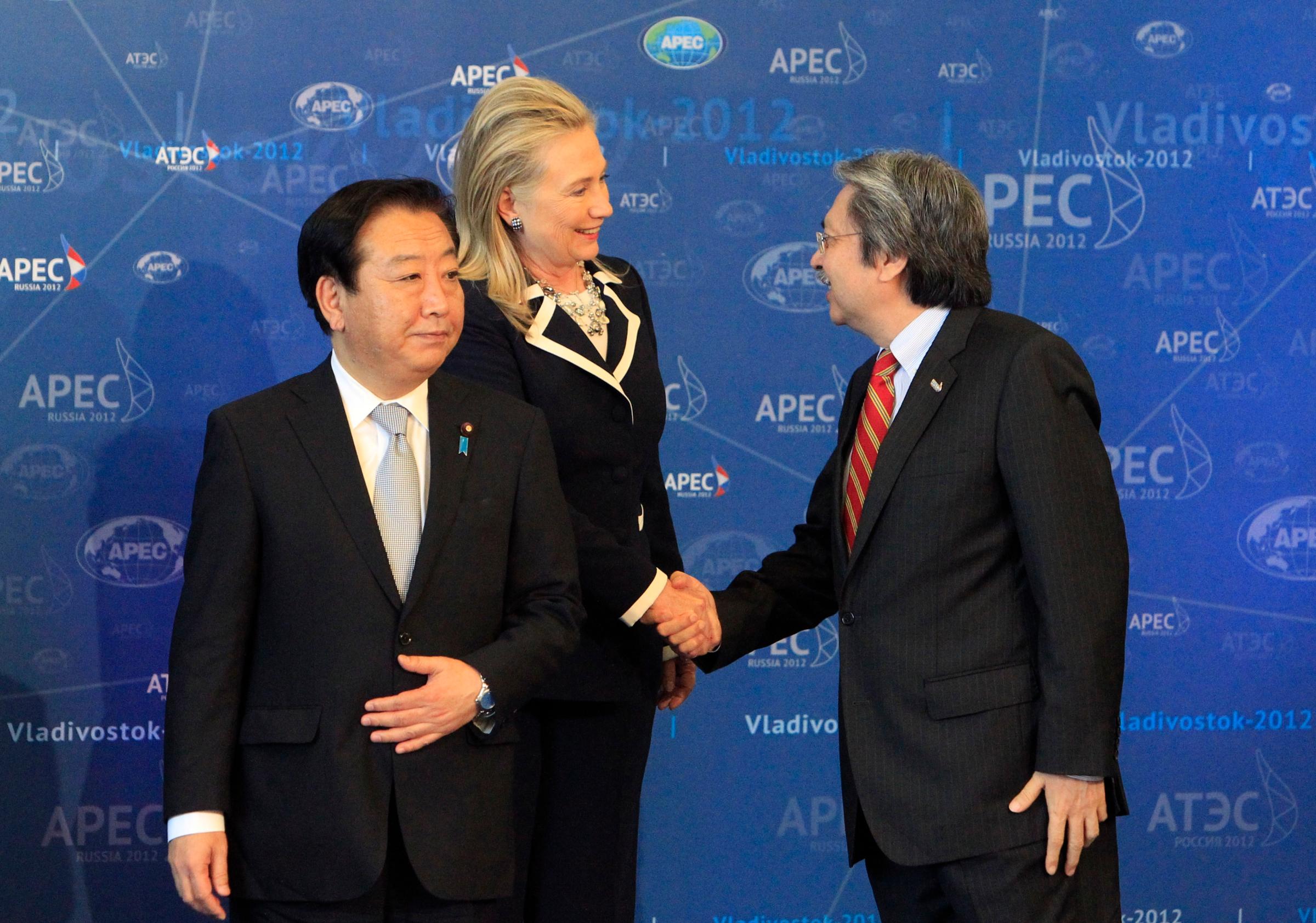
Still, his seemingly casual attitude has cushioned him in the past five years, indisputably the most tumultuous in Hong Kong’s history. The next Chief Executive will inherit a system wrought with malaise, angst, and popular discontent from his or her predecessor, Leung Chun-ying (commonly called C.Y. by Hong Kongers). Leung, a land surveyor who helped draft Hong Kong’s posthandover constitution called the Basic Law, is widely damned as Beijing’s stooge. Under his watch, mainland interference in Hong Kong’s affairs has become endemic. Beijing refused to yield to the demand for direct elections that galvanized the 2014 Umbrella Movement, when hundreds of thousands occupied crucial choke points of the city for nearly three months. Publishers from Hong Kong critical of China’s leaders have vanished and resurfaced in jails north of the border — the most egregious violation of “one country, two systems” since the 1997 handover. Journalists and judges have been harassed, and China’s leaders are pressuring Hong Kong to introduce security laws and “national education” similar to that on the mainland.
Hong Kongers are so anxious that some are even now calling for the territory’s outright independence, which is such a sensitive issue for the authorities that two politicians elected to the legislature on that platform last September were ultimately barred from taking office. (Leung did not run for a second CE term, apparently discouraged by Beijing for being too divisive for Hong Kong, but he was rewarded for his loyalty by being named a vice chairman of the Chinese People’s Political Consultative Conference, a prestigious advisory body.)
“We’ve experienced some quite, er, horrendous situations in the past few years, and trust is something quite rare in our community,” says Tsang, who is open about his unhappiness as Financial Secretary under Leung. “We need to rebuild that — we need to unify the community.”
He has the chivalry to not name names, but it is clear whom Tsang is blaming. Throughout these “horrendous situations” Leung would not entertain public opinion — and neither did Lam, his deputy. In the summer of 2014, she brusquely told a group of pro-democracy activists not to bother protesting in the city’s streets, telling them “their goals will never be achieved.”
What would Lam’s leadership of Hong Kong look like? “Probably disaster,” says Claudia Mo, a pro-democracy politician. “She would be, I’m afraid, even worse than C.Y. Leung. C.Y. Leung is crude and transparent — you can see through him. But Carrie Lam is, to borrow a Chinese phrase, a ‘smiling tiger.’ She’ll eat you up with a smiling face.” Critics label Lam C.Y. 2.0.
“You have to ask yourself why [Tsang] is popular,” says Chan, former Chief Secretary. “Because he speaks the language of the common people. He doesn’t put on airs. It’s very important to Hong Kong people that you are who you pretend to be. Whereas with Carrie, you just feel she does one thing and she’s exactly the opposite behind the scenes.”
(TIME made repeated requests for an interview with Lam but did not get one.)
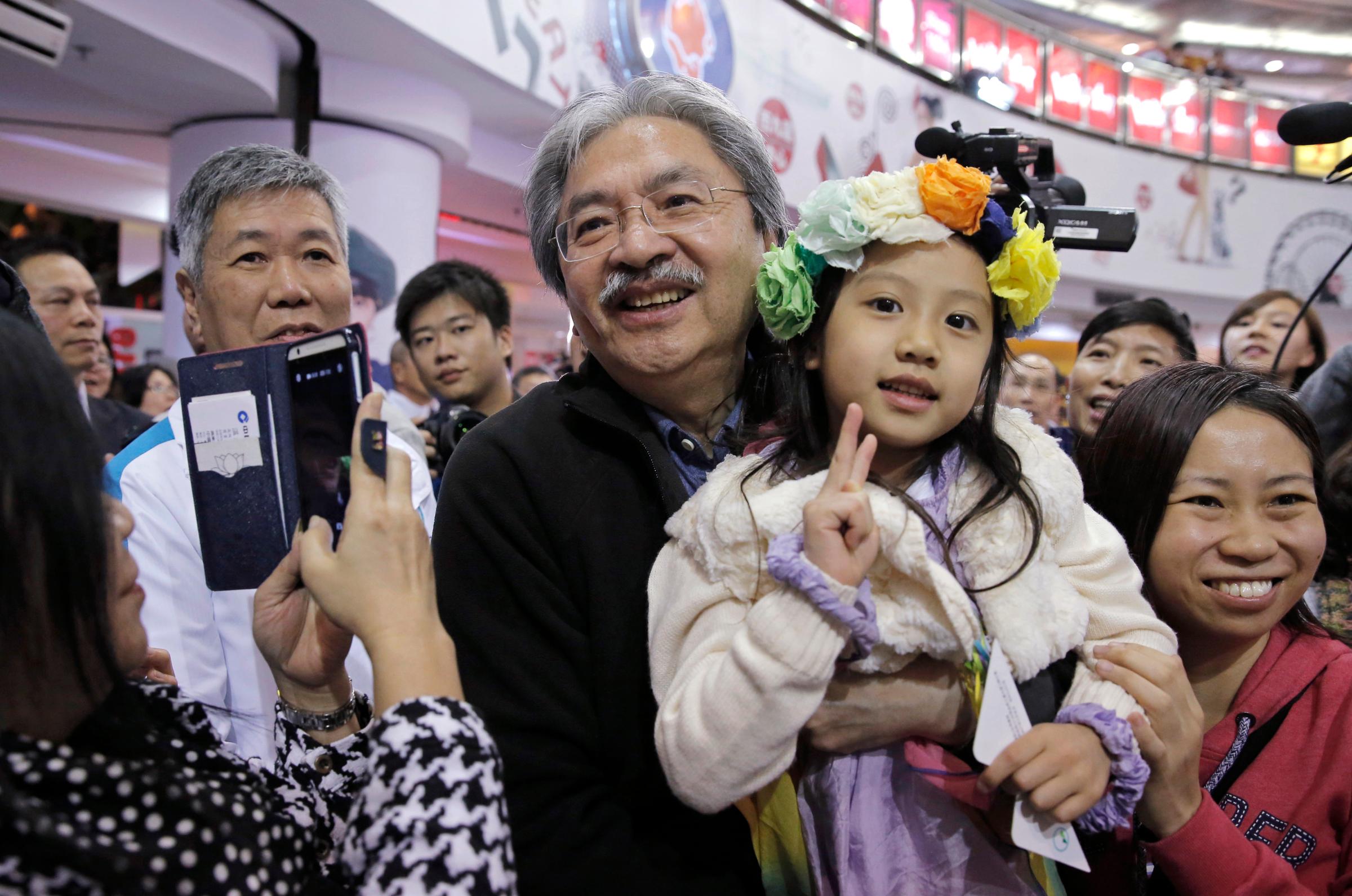
Lam’s most charitable critics condemn her for simply being dull. She is, they say, emblematic of a stultified, provincial, bureaucratic system, one incapable of mitigating the decay of Hong Kong’s status as a global cosmopolitan town. There are the most obvious examples of this — it remains the only major Asian city without a credible museum of modern art, for instance — but it is felt most palpably in the malaise of young people, whose political discontent is an offshoot of a more general hopelessness. According to a survey conducted last September by the Chinese University of Hong Kong, nearly 60% of those under the age of 30 want to emigrate. Rents are staggering, apartments are notoriously minuscule, and job prospects are dwindling. While many employers want to hire people who speak Mandarin or English, or both, the primary medium of school instruction in Hong Kong is Cantonese.
Lam has campaigned mostly on her government experience: she took a job with Hong Kong’s civil service in 1980, shortly after she graduated from the University of Hong Kong, and has never left. Her campaign has skirted the more contentious issues of political reform and instead promised to boost the economy and improve standards of education. One of her campaign platform’s pillars calls for a “new fiscal philosophy” — widely viewed as a thinly veiled dig at Tsang’s fiscal conservatism during his nine-year tenure as Financial Secretary.
Lam also touts her record as a proactive and hard-working official, and criticizes Tsang’s laidback style and Facebook presence. “I’m amazed how much time you had to collect Likes while in government,” she told Tsang during a televised debate on March 12. “There were no files or paper on his desk every time I entered his office, which I admire,” she said, with apparent sarcasm, during a March 19 candidates forum. “That’s hard for me, because I have so many documents on my desk.”
But many Hong Kongers will remember her campaign for its gaffes, which have only entrenched the younger generation’s contempt for her. When confronted by the well-known 20-year-old activist Agnes Chow after a recent election debate, Lam dismissed her as a “little girl.” In her campaign manifesto, she suggested the possibility of a “religious-affairs unit” — a startling echo of the mainland government’s repression of religion north of the border. (She has since said she would not pursue the idea, especially after Hong Kong’s Catholic Church, to whom she belongs, criticized it.) And she has been ridiculed for comparing nasty comments about her and her supporters online to “white terror,” which has to do with state oppression.
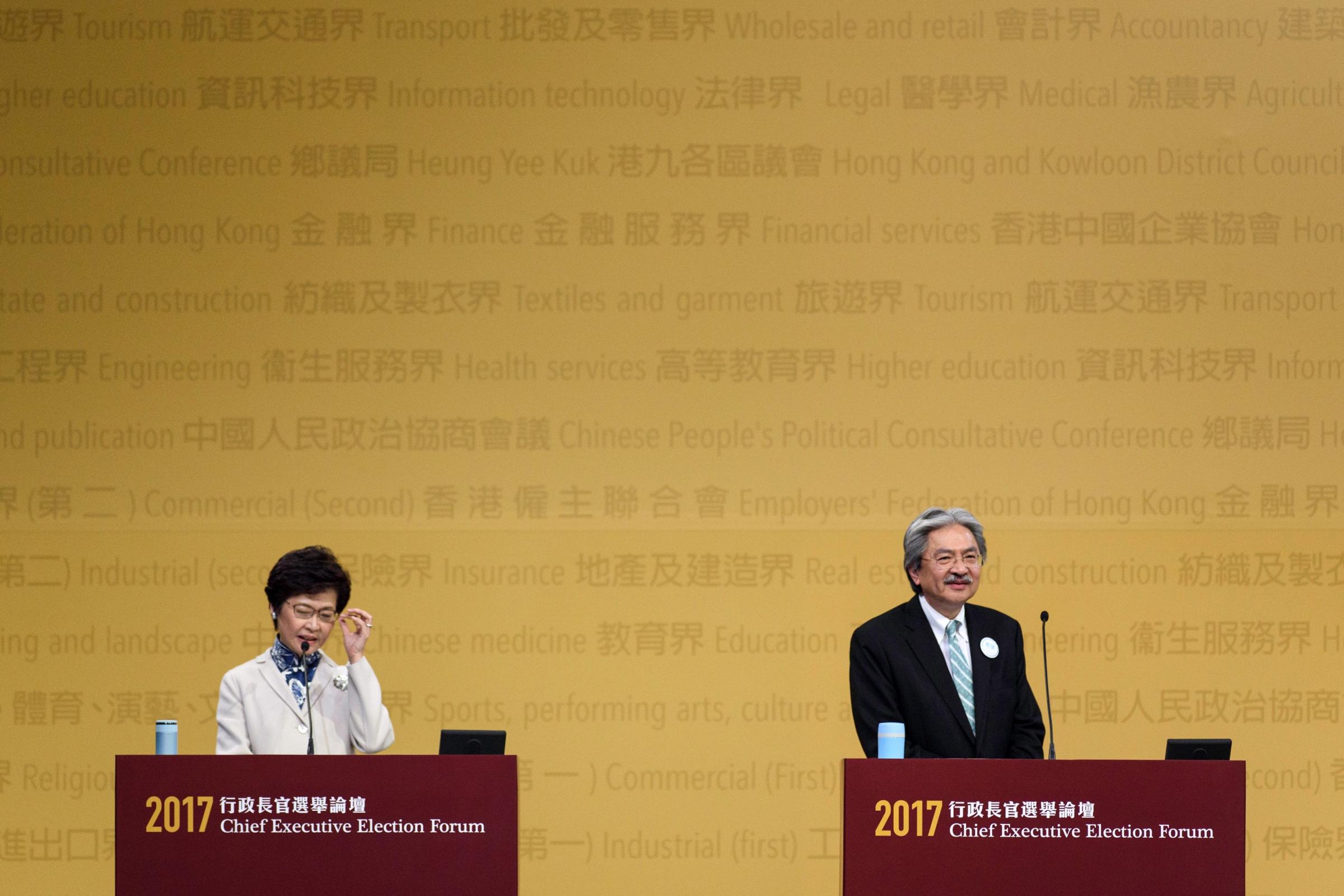
Tsang has a more controlled, urbane air, the product of bourgeois America and hundreds of thousands of miles clocked in trips to financial summits in Davos and elsewhere. In one press photo, he stands before Hong Kong’s impressive skyline in a hooded sweatshirt from the Black Dog, the Martha’s Vineyard pub.
Tsang believes that, in an interconnected world, his global exposure, including to the U.S., is an asset to Hong Kong as well as to the mainland. But for China’s leaders, experts say, stability is paramount; on that, they trust Lam over Tsang. “Beijing’s major concern is someone who will challenge the efforts for Hong Kong independence,” says Zweig. “That’s their top priority. Hong Kong can slide economically. They’ll live with that. But they don’t want to see instability, and they see independence as the major source of instability.”
The irony is that Lam as CE may inflame popular unrest. “The percentage of Hong Kong people against [her] is just incredible,” says Mo. “If she’s [chosen] … once again Hong Kong people will feel they’re being sold out.”
“If John Tsang wins, I think the society’s atmosphere would alleviate a lot,” says Michael Tien, a pro-Beijing tycoon and politician known for his candor. “But if John Tsang wins but then his government falters, it gives a lot of pretext for Beijing to demand that all future Chief Executives be 100% compliant to Beijing.”
Most, but not all, democrats, including those in the Election Committee, back Tsang. “The Chief Executive election is pretty much controlled by the Communist Party, which is ridiculous,” says 23-year-old Nathan Law, a pro-democracy activist who last fall became the youngest person elected to Hong Kong’s legislature. “John Tsang has undoubtedly been better at connecting with people than Carrie Lam, but it’s difficult for us to support him. If we support a candidate in a rigged election, we will be losing legitimacy in our fight for democracy.”
The betting is that Lam will easily win a majority in the committee, not least because many members, especially those with business ties to the mainland, would not want to cross Beijing. But Tsang remains optimistic. Years in Boston made him a New England Patriots fan, and he brings up the team’s performance in the latest Super Bowl — hopelessly down late in the game, but eventually victorious over the Atlanta Falcons 34-28, in the biggest championship comeback ever. “So,” says Tsang, “never give up.”
—With reporting by Kevin Lui / Hong Kong
More Must-Reads From TIME
- What Student Photojournalists Saw at the Campus Protests
- How Far Trump Would Go
- Why Maternity Care Is Underpaid
- Saving Seconds Is Better Than Hours
- Welcome to the Golden Age of Ryan Gosling
- Scientists Are Finding Out Just How Toxic Your Stuff Is
- The 100 Most Influential People of 2024
- Want Weekly Recs on What to Watch, Read, and More? Sign Up for Worth Your Time
Contact us at letters@time.com